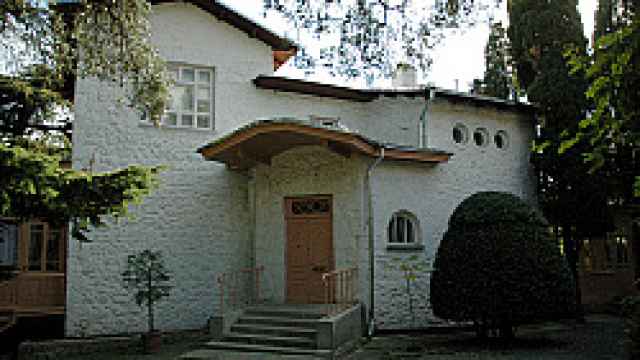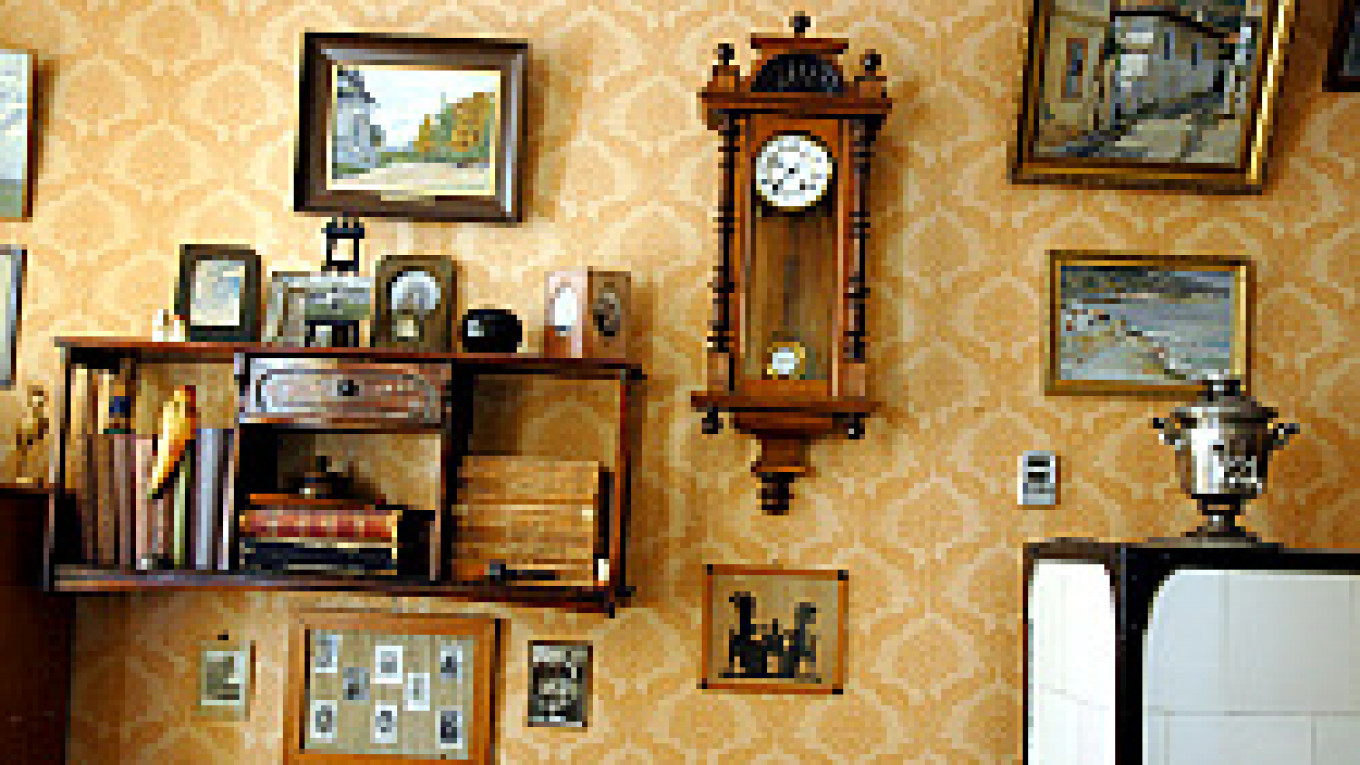The dacha -- a fin-de-siecle, three-story structure -- sits on a steep road to the northwest of the city. It was built when Chekhov, because of lung problems, was advised to move to a warmer climate from his beloved Melikhovo, a town outside Moscow. He moved to the Yalta house in 1899 and left five years later for Germany, where he would die.
The White Dacha has changed little since Chekhov left it for the last time. The garden is filled with trees that he planted. A treasure chest worth of bric-a-brac hangs on the walls inside, including a painting by one of Russia's most famous landscape painters, Isaac Levitan.
Composer Sergei Rakhmaninov once played the piano that sits on the ground floor, and Maxim Gorky sat on a green bench in the corner of the luscious garden.
Yet despite its historical importance, it has been starved of funds by the local government whose care it is under and attracts few visitors. The garden was still in full bloom on a recent visit and three litters of kittens clustered around the trees. Sunlight poured through the windows of Chekhov's sister Maria's room, illuminating the collage of photographs on her golden-hued walls, but few tourists were there to see the landmark -- Chekhov's last real home.
The dacha is currently in a dire state. The heating stopped working in 2005, the wallpaper is moldy and leaks in the roof could cause untold damage to the priceless objects underneath.
The miniscule amount of money the museum receives from the Crimean government's culture ministry is barely enough for the upkeep of the dacha let alone its restoration.
"[The dacha] is in a strange position," said Dr. Rosamund Bartlett, a Chekhov scholar and translator who wrote the biography, "Chekhov: Scenes From a Life," among other books on Russian literature. "The Russian government didn't want to fund the restoration because the house is in Ukraine, and the Ukrainian government didn't want to pay to promote a Russian author."
 for MT | |
Bartlett visited the museum for the first time in 2007 when she was researching her biography of Chekhov. "It was very poignant," she said. "You can see how isolated he was, how much he missed Moscow." Bartlett returned to the dacha in May of last year to find that the White Dacha was in bleak condition. "Half the museum was closed, it was very depressing. It was obvious that the Ukrainian government wasn't interested in doing anything about it."
Its fate stands in stark contrast to better-funded projects like the Chekhov Theater in Yalta and the house of Chekhov in Melikhovo, which is a reconstruction rather than an authentic artifact like his intact former Yalta home.
Chekhov suffered tuberculosis and lung problems for most of his life. A doctor himself, he knew the importance of Yalta's warm climate and commissioned Lev Shapovalov to design the house.
The dacha has a remarkable design, featuring distinct facades and giving off the illusion of having many different levels depending on which side of the house you are viewing it from. There are seven entrances, with the main one marked by a peach-colored door, and there is a mix of rectangular and circular windows like portholes in a ship.
Inside, Chekhov's study remains intact. Rich, patterned wallpaper that looks like the patterns in a Gustav Klimt painting cover all the walls. His desk, enclosed in a glass case, has the pens he wrote with, a bronze paperweight with three girls on it that was given to him after he wrote "The Three Sisters," an ornate scale that he used to measure medicine and a stamp embossed with his name with which he would mark prescriptions. Chekhov still worked as a physician in the dacha despite his ill health, and friends would often drop by for medical advice.
The study is full of art and photos collected by Chekov. An ink work by Chekhov's father, the only one in existence today, hangs on one wall. Sepia?€“toned photographs of actresses and actors as well as a picture of Leo Tolstoy hang nearby.
There is a model of a Russian village given to him by a Christian community in Melikhovo, where he built several schools, and a "no smoking" sign made for him by a friend, because Chekhov was too polite, despite his ailing lungs, to tell people not to smoke.
A landscape painting by Chekhov's friend Levitan is framed proudly above the fireplace. The image stood to remind him of his home near Moscow.
"You stand here and you can't believe that Chekhov touched this rail, that he walked here, that he slept on this bed," said Alla Golavacheva, the director of the museum, motioning toward the modest bedroom adjoined to the study.
Maria Chekhova inherited the house on her brother's death and lived there till her death in 1957. It has been in state hands since 1921.
She "kept it the way that Chekhov had left it," said Golavacheva, who has tried to do the same.
In 2010, there are plans for the Russian Federation to celebrate 150 years since Chekhov's birth, and an official "Chekhov Year" has been marked by UNESCO. The dacha does not feature in any of the plans.
It is only in the last month that the White Dacha has begun to get the attention it deserves. The dacha launched a restoration campaign timed to coincide with the release of a new Chekhov anthology edited by Bartlett, which is backed by Chekhov fans, actors Kenneth Branagh and Ralph Fiennes -- who have appeared in a number of Chekhov productions -- and author Michael Frayn, a noted translator of Chekhov plays into English.
Russian magnate Alexander Lebedev also recently organized a trip to the nearby Chekhov Theater, and actors Kevin Spacey and John Malkovich have backed a restoration plan.
Golavacheva has persuaded the city of Chekhov, near Moscow, to pay $35,000 to repair the wallpaper and has commissioned a paper factory in Penza to replicate the damaged originals. Sberbank paid for roof repairs to the value of 1,000,000 hryvnias ($161,300), but a lot of work still remains to be done.
"Come winter, the heating won't work, and mold will once again return," Bartlett said.
The campaign hopes to raise money for vital repairs; fixing the heating, repairing the foundations and turning the poorly marked site into a tourist attraction.
Playwright Tom Stoppard, who has adapted several Chekhov plays and plans to stage his version of "The Cherry Orchard" in January 2009, jumped at the opportunity to help the campaign and went to the dacha earlier this year.
"I have only had one experience that was comparable to this, and that was visiting Anna Akhmatova's house in St. Petersburg," he said.
"The level of authenticity is incredible," Stoppard continued. "Some people don't care about the importance of the original -- the pen Chekhov wrote with, the bench that Gorky sat on ... but I am one of those people whose blood turns over at the thought of all this."
A tour to the White Dacha has been organized for April 2009. For more info, see www.exeterinternational.co.uk/chekhov.htm. For more information on the campaign, see yaltachekhov.org
A Message from The Moscow Times:
Dear readers,
We are facing unprecedented challenges. Russia's Prosecutor General's Office has designated The Moscow Times as an "undesirable" organization, criminalizing our work and putting our staff at risk of prosecution. This follows our earlier unjust labeling as a "foreign agent."
These actions are direct attempts to silence independent journalism in Russia. The authorities claim our work "discredits the decisions of the Russian leadership." We see things differently: we strive to provide accurate, unbiased reporting on Russia.
We, the journalists of The Moscow Times, refuse to be silenced. But to continue our work, we need your help.
Your support, no matter how small, makes a world of difference. If you can, please support us monthly starting from just $2. It's quick to set up, and every contribution makes a significant impact.
By supporting The Moscow Times, you're defending open, independent journalism in the face of repression. Thank you for standing with us.
Remind me later.


